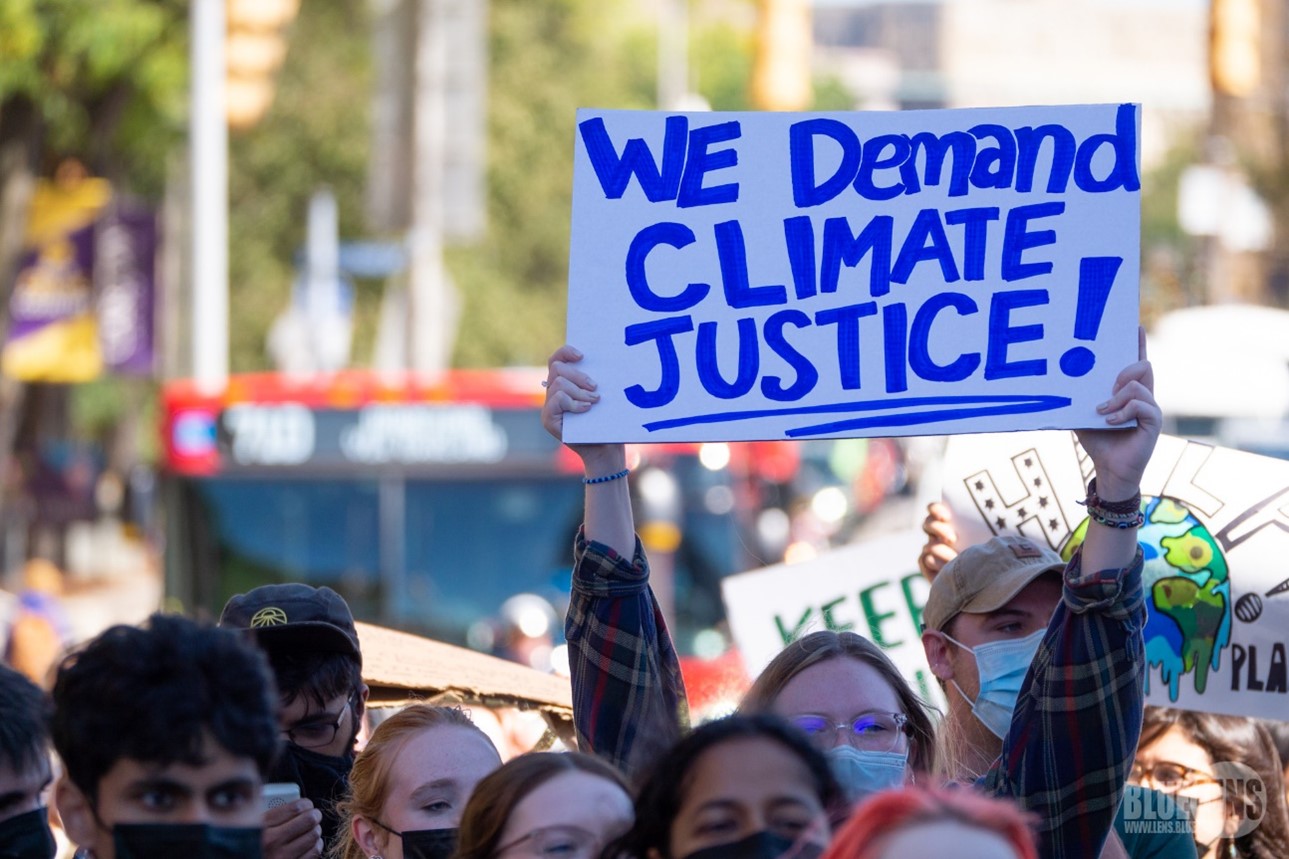
Climate justice demonstration. CC: BlueLENS (www.blue.lens)
The University of Twente – LOCALISED partner – has recently strengthened its professional, research and practice expertise in the domain of climate change. Along with the Green Hub Twente, the platform for sustainability transformation at the UT, and the UT Climate Centre, the recent appointment of Debra Roberts as a part-time Professor at the Faculty of Geo-Information Science and Earth Observation (ITC) at the University of Twente clearly bolsters UT’s commitment to build capacity to and conduct research on one of the most pressing challenges of this century.
The week of the 6th of November, prof. Roberts visited her new part-time Faculty and shared her extensive knowledge and expertise with its members. She left significant statements while holding several meetings with staff members and research groups, presenting colloquiums, and responding to interviews. Prof. Roberts is an energetic supporter of equity and justice aspects. One of her remarkable quotes were “[…] You are not going to get the ambitious climate action you want or the ambitious change of in the current city circumstances without an improvement on equity and justice […]”.
‘Everything you need to know about climate change – latest findings from the IPCC’ - Debra Roberts
‘Climate Change Adaptation - GeoHero’ - Interview to Debra Roberts
Indeed, ensuring a just transition and just adaptation not only ensures protecting everyone from climate change impacts but also makes implementing our climate actions more feasible. Justice has been increasingly discussed in the realm of climate action in recent years. Several authors detected a risk of increasing existing vulnerabilities or introducing new vulnerabilities while implementing mitigation or adaptation actions[1,2]. The Intergovernmental Panel on Climate Change (IPCC) and other well-recognised authors have identified these facts as malmitigation or maladaptation. While at the beginning of the uptake of climate actions, their outcomes were still unknown, now, decades of experience in implementing climate actions have taught us what, in theory, logical actions such as increasing taxes on local fuel could do to economically vulnerable citizens[3–7]. Obviously, communities suffering from these unintended negative effects of climate actions are not happy about this[8]. Thus, in many countries around the globe, the critique of low-carbon transitions by social groups is rising[8].
Usually, critique is grounded in the final distribution of benefits or burdens, i.e., distributional injustice, or related to attempts that harm their local identity without any previous consultation, i.e. procedural injustice[2,8–10]. Planning climate actions with social groups being part of the process – increasing procedural and recognitional justice – also increases the potential for distributional justice—hence, equitable and just climate action. While doing so, the acceptability of climate actions is likely to increase[3,11]. Moreover, the involvement of stakeholders might also increase the technical and/or economic capacity of social groups, making climate action more likely to succeed overall [12,13].
We shall be aware that justice and equity are not merely random factors we must include in our climate agenda but that they help achieve climate goals—we should make them paradigms of climate action, as Prof. Roberts remarks.
REFERENCES
[1] A.T. Amorim-Maia, I. Anguelovski, E. Chu, J. Connolly, Intersectional climate justice: A conceptual pathway for bridging adaptation planning, transformative action, and social equity, Urban Clim. 41 (2022) 101053. https://doi.org/10.1016/j.uclim.2021.101053.
[2] S. Hughes, M. Hoffmann, Just urban transitions: Toward a research agenda, Wiley Interdiscip. Rev. Clim. Chang. 11 (2020). https://doi.org/10.1002/wcc.640.
[3] P. Kashwan, Climate justice in the global North: An introduction, Case Stud. Environ. 5 (2021) 1–13. https://doi.org/10.1525/cse.2021.1125003.
[4] K. Mintz-Woo, Carbon tax ethics, Wiley Interdiscip. Rev. Clim. Chang. (2023) 1–15. https://doi.org/10.1002/wcc.858.
[5] B.K. Sovacool, Who are the victims of low-carbon transitions? Towards a political ecology of climate change mitigation, Energy Res. Soc. Sci. 73 (2021) 101916. https://doi.org/10.1016/j.erss.2021.101916.
[6] B.K. Sovacool, P. Newell, S. Carley, J. Fanzo, Equity, technological innovation and sustainable behaviour in a low-carbon future, Nat. Hum. Behav. 6 (2022) 326–337. https://doi.org/10.1038/s41562-021-01257-8.
[7] B.K. Sovacool, B. Linnér, M.E. Goodsite, The political economy of climate adaptation, Nat. Publ. Gr. 5 (2015). https://doi.org/10.1038/nclimate2665.
[8] R.E. Shelton, H. Eakin, Who’s fighting for justice?: Advocacy in energy justice and just transition scholarship, Environ. Res. Lett. 17 (2022). https://doi.org/10.1088/1748-9326/ac7341.
[9] P. Tschakert, M. Parsons, E. Atkins, A. Garcia, N. Godden, N. Gonda, K.P. Henrique, S. Sallu, K. Steen, G. Ziervogel, Methodological lessons for negotiating power, political capabilities, and resilience in research on climate change responses, World Dev. 167 (2023) 106247. https://doi.org/10.1016/j.worlddev.2023.106247.
[10] C. Godinho, What do we know about the employment impacts of climate policies? A review of the ex post literature, WIREs Clim. Chang. 13 (2022). https://doi.org/10.1002/wcc.794.
[11] K. Swanson, Equity in Urban Climate Change Adaptation Planning: A Review of Research, Urban Plan. 6 (2021) 287–297. https://doi.org/10.17645/up.v6i4.4399.
[12] K. Swanson, Centering Equity and Justice in Participatory Climate Action Planning: Guidance for Urban Governance Actors, Plan. Theory Pract. 24 (2023) 207–223. https://doi.org/10.1080/14649357.2023.2189288.
[13] A. Garvey, J.B. Norman, M. Büchs, J. Barrett, A “spatially just” transition? A critical review of regional equity in decarbonisation pathways, Energy Res. Soc. Sci. 88 (2022) 102630. https://doi.org/10.1016/j.erss.2022.102630.

Recent Comments